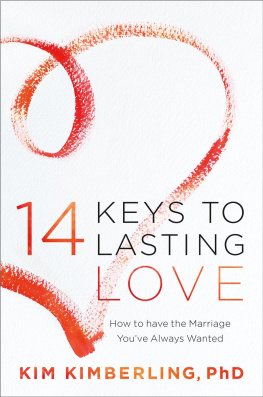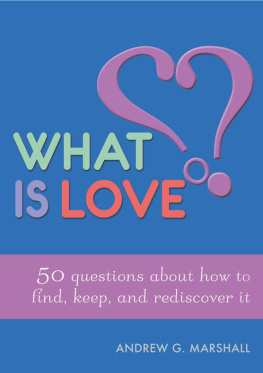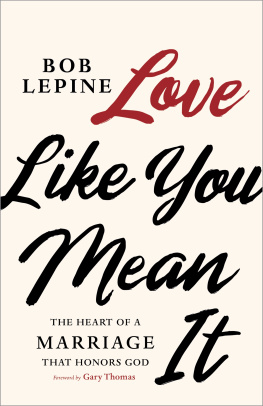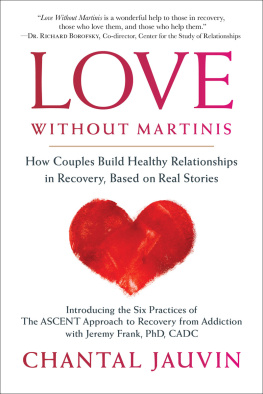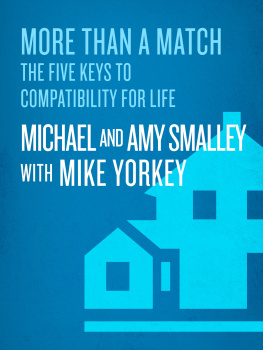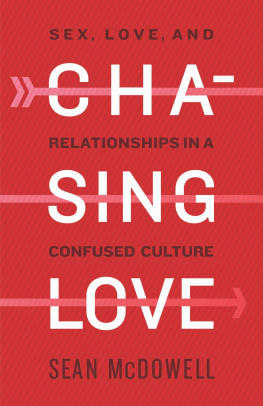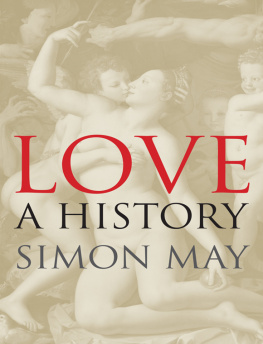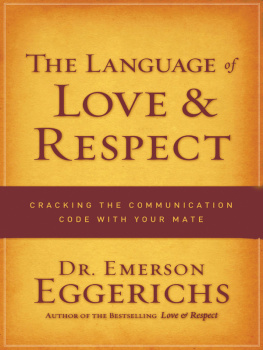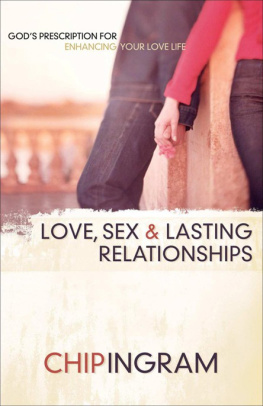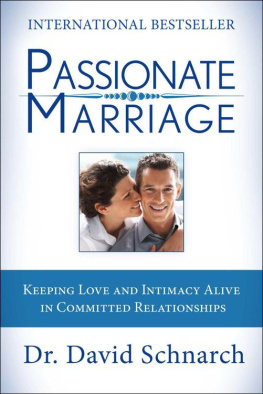
ALSO BY SAM R. HAMBURG,PH.D.
Understanding Alcoholism and Problem Drinking
(with W. R. Miller and V. V. Rozynko)
WILL OUR
LOVE LAST?
A CO U P L E S RO A D MA P
Sam R. Hamburg, Ph. D.
S C R I B N E R
New York London Toronto Sydney Singapore

S C R I B N E R
1230 Avenue of the Americas
New York, NY 10020
Visit us on the World Wide Web:
http://www.SimonSays.com
Text copyright 2000 by Samuel R. Hamburg
Drawings copyright 2000 by Gene Mackay
All rights reserved, including the right of reproduction in whole or in part in any form.
SCRIBNER and design are trademarks of Macmillan Library Reference USA, Inc., used under license by Simon & Schuster, the publisher of this work.
Permissions are under the section Permissions.
ISBN-10: 0-7432-0352-6
ISBN-13: 978-0-7432-0352-4
To Luba, Sue, Anna
Authors Notes
Privacy
I have taken care to protect the privacy of the people whose stories are told in this book. Names and other identifying details have been changed. In some instances, elements from several similar cases have been amalgamated into one story.
Whos Who
Over the years as a psychologist, I have not done many workshops or seminars. I dont generally talk to large groups of people. I talk with only one or two people at a time. Thats what Ive been imagining as Ive been writing this book: just you, who are reading this book, or listening to your partner read it to you, and methe two or three of us in a quiet room somewhere. And as Ive been writing this booktalking to youIve been listening hard for what youve been saying back to me.
As part of making this book sound as if we are talking, I have referred to your partner as they rather than as he or she, because when we talk with each other thats what we do. If you were talking with me you wouldnt say, When someone on the street comes up to me, and he or she asks me for spare change, I usually reach into my pocket and give him or her something. You would say, When someone on the street comes up to me, and they ask me for spare change, I usually reach into my pocket and give them something, which would sound perfectly natural to both of us. And anyway, you know whether your partner is a he or she.
Acknowledgments
This book is the direct result of a conversation with Dr. Eugene H. Winkler, pastor of First United Methodist Church, The Chicago Temple. I had never seriously considered writing a self-help book. On the morning of the day I started writing this bookthe day of that conversationI had no idea I would write it.
Dr. Winkler had invited me to give a series of talks on marriage at his church. He and I met one day in September 1997 to talk about what I might say. At the end of the conversation Dr. Winkler said, Sounds great. Why dont you write me an outline? As soon as he left my office I startedonly I dont do outlines. I simply started writing the text for the first talk. By the second page, I realized that I was writing a book. When I later told Dr. Winkler that I had written the book because of our conversation, he demurred and suggested that I owed the book not to him but to Someone Else. I am in no position to argue, but I thank Gene Winkler, from the bottom of my heart, for being at least the agent of Providence.
Speaking of agents of providence... my agent, Candice Fuhrman! I will always be grateful to Candice for taking me on and for her wise guidance ever since. Likewise, I will always be grateful to Susan Moldow, of Scribner, for seeing value in my project.
The book owes its present form to two friends who were among its earliest readers, Reverend Paul Walther and Father Thomas Aldworth. Paul identified a major problem in the presentation of what are now chapters 9, 10, and 11. Tom read the manuscript with great care, made extensive notes, pointed out the same problem, and in a sentence told me how to correct it. I will always be grateful to Paul and Tom for their help.
Other people who read all or part of the manuscript and made critical and helpful comments include Lonnie Barbach, Daniel J. Conti, Susan crane, Toni Del Bene, Violet Franks, Susan Gal, Alan S. Gurman, Arnold A. Lazarus, Brian Moore, Tim Mulder, David Siegman, and Rita P. Sussman. I thank them all for their time and attention, and for their ideas. I am especially indebted to Elsa Dixon for her many astute editorial comments and corrections.
It was my great good fortune to be assigned Jake Morrissey as my editor at Scribner. Working with him has been a pleasure, and I am grateful to him for reminding me that there is always room for improvement.
Gene Mackay has been called one of the finest draftsmen alive, and his works can be found in museums. It is a privilege to have his beautiful drawings in my book.
I, and this book, have benefited from twenty years of conversations with Timothy J. OConnellconversations about literature, philosophy, science, and many other things in addition to psychology. Tims mark is all over this book, in some places I can identify and in others I cannot.
Most of what psychotherapists know they have learned from their clients. My clients have given me so much. I can only hope that at least some of them feel they have received fair exchange.
Finally, thanks are due to all the musiciansfrom Emma Kirkby to Sonny Rollins to Stevie Wonderwhose gifts grace us with ecstasy.
WHAT ABOUT my wife? This book is her acknowledgment.
PART ONE
Marriage
and
Happiness
1
T HE Q UESTION :
W HAT M AKES
M ARRIAGES H APPY?
Mystified by Love
A young womancall her Janesits on the couch in my consulting room. She is wearing a tailored wool suit and has the crisp, put-together look of the successful career woman that she is. Jane is distraught and tearful. Her long, straight hair sweeps across her face as she cries. Between her sobs, this is what she says:
I dont know if I love Bob anymore. But why shouldnt I? Hes the perfect person. Hes handsome, thoughtful, polite, hardworking, successful. Hes from a great family. I know I loved him in the beginning... I think. But now, after being married five years, its different. And then this guy in the office, Jim. I know hes interested in me. And Im so attracted to him, hes getting harder and harder to resist. Hes not nearly as good-looking as Bob, yet when Im around himwhen I think of himI get this sexual rush. And when we talk, I feel so in tune with him. I think I love himbut I shouldnt.
Like so many people, married or not, Jane is mystified by love. She knows how love feels, but she doesnt know what love is. She cant account for why it flowers in her heart and why it withers. Mystified as she is by love, she cant answer one crucial questiona question whose answer will determine the future course of her life: Am I with the Right Person?
Men and women in love are haunted by this question. You may be haunted by it right now. You know that most peoples marriages are not happy. You knowwe all knowthe statistics: Half of all marriages break up. As for the other half, you know that many of those people are not happy. Theyre trapped inside their intact marriages. And what spooks you most of all is knowing that many of these unhappy people were passionately in love at the startjust as you may be right now.
But you also know that some peoples marriages are happy, and stay happy for a very long timeforever. Youve seen and read true stories about happily married couplesPaul and Linda McCartney, for example. You may even know a happily married couple or two yourself. You see that the people in these marriages seem to work together smoothly as a team. They seem to genuinely like each other and to enjoy each others company. And if you know them well enough, they may have even confided to you that they enjoy each other in bedeven after having been together for many years. When we get married, we hope that ours will be one of those exceptional, happy marriages. What makes the difference between a happy and an unhappy marriage?


